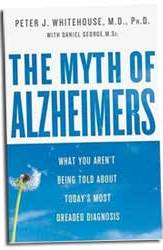- Home
- Caregiving Topics
- Books
- Speaker
- Resources
- TCV Community
- About / Contact TCV


 Having lost my father to a massive stroke likely caused by late-stage Alzheimer’s, this is a strange question to be asking.
Having lost my father to a massive stroke likely caused by late-stage Alzheimer’s, this is a strange question to be asking.
After three decades of research, Peter Whitehouse, MD with his colleague, Danny George, MSc, takes a controversial look at Alzheimer’s, in The Myth of Alzheimer’s: What you aren’t being told about today’s dreaded diagnosis.
Whitehouse says, the more we learn about this disease called Alzheimer’s, the more questions we have. He and George present a comprehensive 100-year history of Alzheimer’s, from Dr. Alois Alzheimer’s discovery through the present time. They also detail how our brains work, current and future treatments, how drug companies benefit from the “medicalization” of Alzheimer’s, and explore genetics studies. They conclude as Dr. Alzheimer’s did over 100 years ago, that Alzheimer’s might not even be a single treatable disease–in other words, we are unlikely to find a cure.
What then did my father have? What then do some 26 million people worldwide have, if not Alzheimer’s?
Whitehouse and George argue that the “Alzheimer’s” label ostracizes victims and makes them lose hope. It creates fear and motivates wealthy donors to open their wallets wide at lavishly appointed gala events in hope for a cure. Instead of using military metaphors (We need to fight this devastating disease. We are waging a war against Alzheimer’s.), Whitehouse urges us to focus on prevention (eating right, living with less stress; challenging our brains, exercising, and avoiding toxic environmental exposure). He adds that a new construct of “brain aging” and cognitive decline as a natural result of growing older will give families an opportunity to exercise compassion for one another.
It’s hard to dismiss Whitehouse. He has a credible voice. His evidence comprehensive and I highly recommend this as reading for all physicians, nurses, and social workers who work with people who show signs of dementia. I also recommend family caregivers read this; although some of the technical information might be challenging. Still, it’s worth the effort to gain greater knowledge.
One point bears mentioning however; Chapter after chapter, I couldn’t help but think, “Yeah, he got his! Now, he fesses up.” After admitting to receiving lucrative consulting contracts with pharmaceuticals and grants; Whitehouse has managed to have an enviable career. Now a millionaire, assuming he spent and invested wisely, he trashes the very industry that helped him achieve what he now has.
Yet his argument resonates with me, because I’ve long advocated the front-line soldiers in this–the caregiver. (Sorry for the military analogy, Peter!) And the leading organization to see us through is the Alzheimer’s Association that has moved away from the grassroots cultivation and support of caregivers while integrating community resources to creating its own empire and finding a (well-funded) cure.
So does Alzheimer’s really exist?
Maybe not. Was my well-read father’s brain just finding it more difficult to make sense of his world because he was growing older? Is brain aging simply a part of living a long life? What about those who are diagnosed early on, in their 40s or 50s?
With The Myth of Alzheimer’s, Whitehouse and George initiate a need to reevaluate where we are with the leading cause of dementia–Alzheimer’s. While pharmaceutical companies continue to allocate dollars toward finding a cure and progress is undoubtedly being made in some research labs, we as a society need to candidly address what advantages there are in continuing to label our brain-impaired loved ones with Alzheimer’s. Who knows, while searching for a cure for a completely unrelated condition, a researcher may accidentally find a treatment to reduce symptoms related to Alzheimer’s or brain aging.
We need to address the implications of moving away from the label “Alzheimer’s” and the impact this will have on how families manage care and what kinds of support will be available to families to help meet the increasing caregiving burden.
To apply Whitehouse and George’s label, instead of the Alzheimer’s Association we’ll now have the Brain Aging Association (BAA).
I often give books away after reviewing them. This is a book I’ll keep for a while.
Reviewed by Brenda Avadian, MA on January 19, 2009
Founder, TheCaregiversVoice.com

See more in the TCV's Video Channel
The Caregiver's Voice ©1998-2026 [DBA: North Star Books] Privacy Policy Webmaster: Tech Friend

